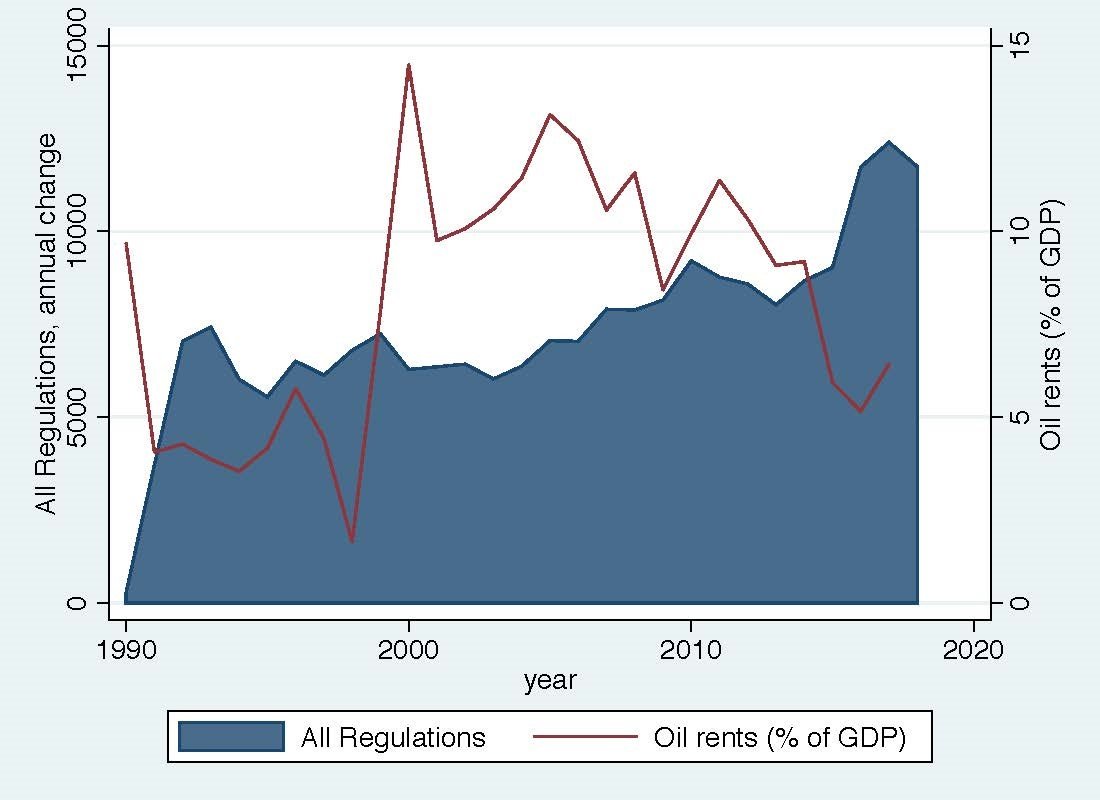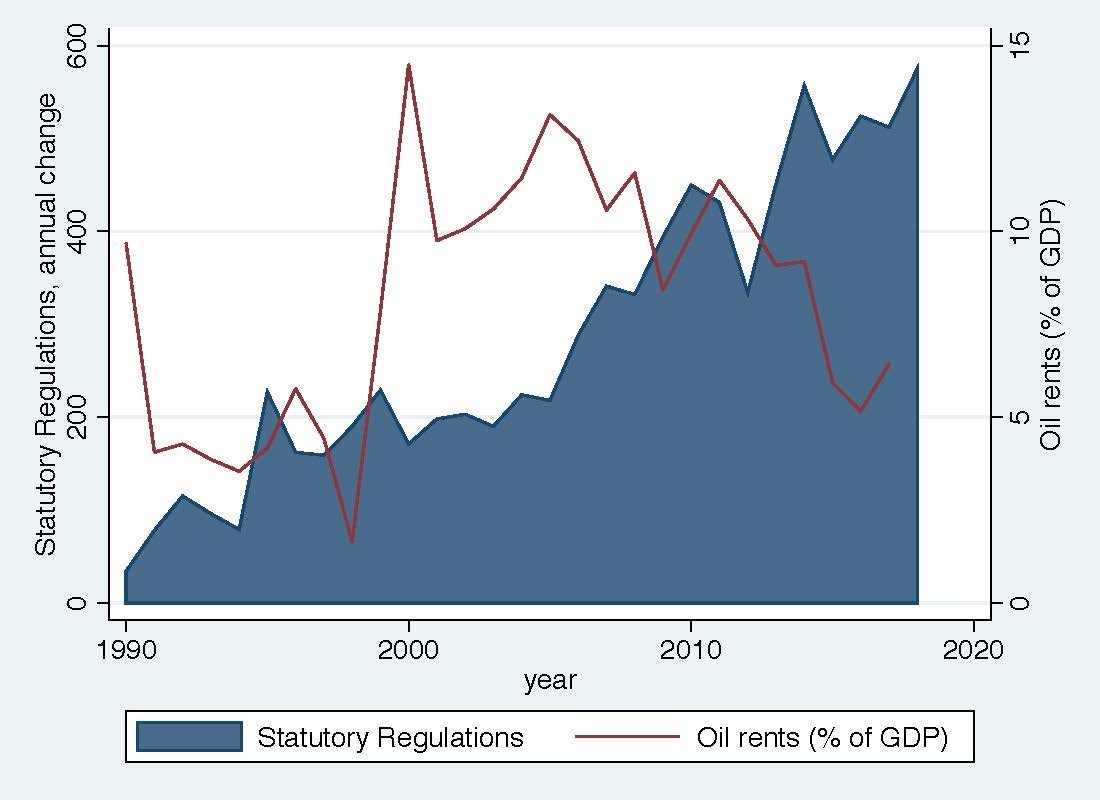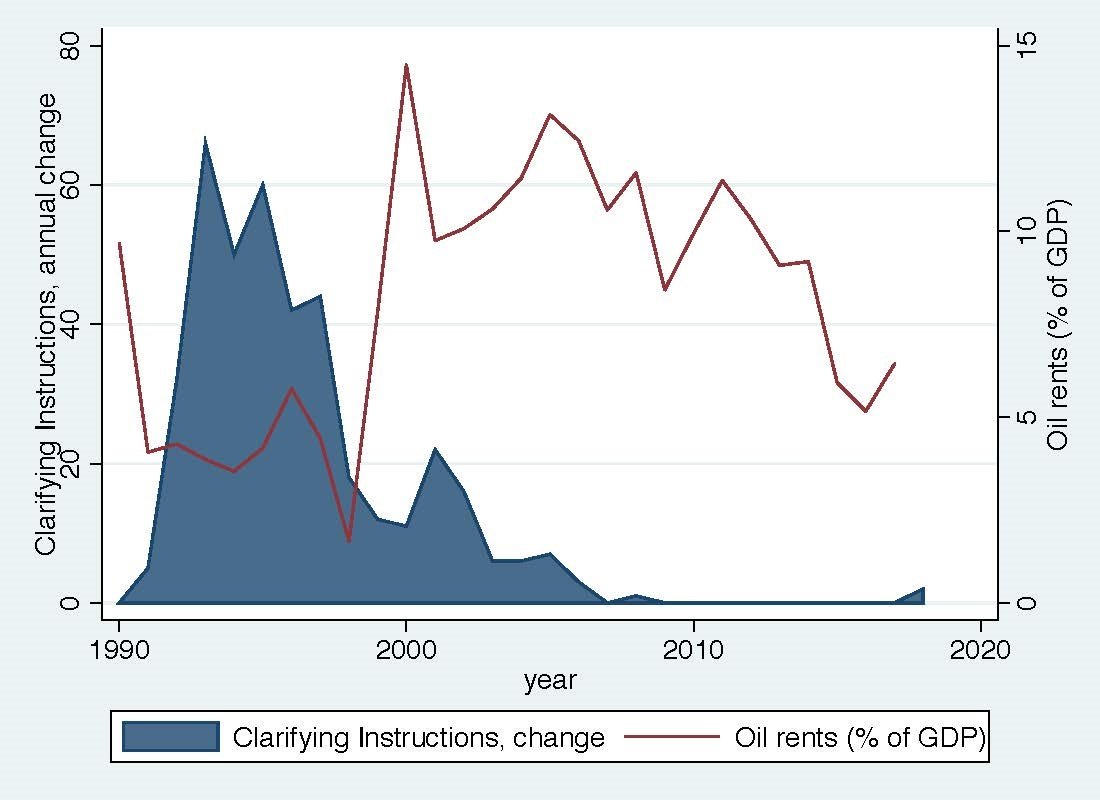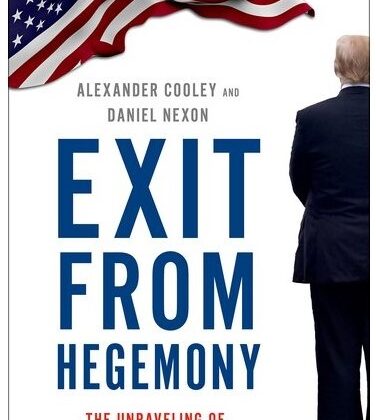(PONARS Eurasia Policy Memo) In autocratic settings, much of what we know about economic regulation does not explicitly account for the fact that objectives, constraints, and opportunities faced by states, businesses, and bureaucrats are different from those in democracies—even if democratic and authoritarian rulers pursue similar policy objectives. Different political regimes are built on somewhat different configurations of state institutions that are used to enforce a government’s policy. Unlike democracies, which may discipline recalcitrant bureaucrats through mechanisms of public accountability, authoritarian regimes—Russia being a good example—rely upon statutory controls to constrain haphazard policy application. Such controls cut down on bureaucratic rents and improve regulatory efficiency, but may undercut elite recruitment strategies and state sector support for authoritarianism. My empirical analysis shows that in Russia, stronger efforts to constrain discretionary regulatory bureaucracy come during times of shrinking oil revenues.
Regulatory Policy and Its Implementation
The de facto regulatory environment experienced by a firm is shaped not only by a state’s regulatory policy, but also by the policy implementation practices that may or may not be spelled out in official regulatory norms.
Executive agencies implementing regulatory policy may enjoy considerable independence from politicians who design regulations. Such independence may come from various sources, such as budgetary autonomy, insulation from political appointments, internal personnel control, and freedom to exercise independent decision-making in areas that pertain to the agency’s mission and operations. When politicians design administrative agencies, they empower bureaucrats to carry out regulatory policies by exercising these functions with varying degrees of autonomy or independence from political interference.
Bureaucratic discretion in policy implementation allows civil servants entrusted with the application of economic regulation to influence firms’ compliance costs. In the process of interpreting regulatory norms and designing mechanisms for monitoring compliance, bureaucrats might create additional hurdles for meeting policy-established criteria, demonstrating compliance, or correcting violations. Such ability to alter a part of the regulatory compliance cost may significantly affect the way in which economic agents experience regulatory policy.
Moreover, because red tape is not part of official regulatory policy and can be “cut” by bureaucrats without undermining any laws, an agency’s freedom in policy implementation may result in either greater favoritism or hostility to specific firms, locations, or sectors. Effectively, bureaucrats may increase or decrease the cost of regulatory compliance imposed on firms beyond those specified by the official regulatory policy.
Not all bureaucratic agencies, however, may be able to engage in strategic manipulation of the regulatory environment. Formal constraints on bureaucratic discretion can curtail both bureaucrats’ rule-enforcement and ability to alter regulatory procedures or selectively apply them. This system is not immune to corruption, but in the absence of discretionary power to interpret the content of a regulation, define compliance criteria, and design enforcement practices, bureaucrats cannot manipulate a firm’s environment to entice corruption and extort bribes.
The “Politicians’ Dilemma”
How does discretionary policy application affect politicians? Assuming that politicians are motivated to retain their office, regulatory regimes present a set of choices. Good aggregate economic performance ensures that the state presides over an expanding economic pie and national economic wellbeing, whereas preferential treatment of special interests or core constituencies might be essential for politicians’ survival in office. These two considerations present politicians with a fundamental dilemma: regulatory arrangements that promote aggregate economic performance might undercut the mechanisms for rewarding political loyalty. Numerous studies of this “politicians’ dilemma,” suggest that considerations of political survival are consequential for the choice of state economic policy and the institutional configuration of administrative agencies.[1]
Institutional independence of regulatory bureaucracy from political principals, however, receives conflicting assessment. Barbara Geddes, a leading authority on political regimes, sees administrative agencies’ independence as an attribute of greater state capacity and competence. On the contrary, Vladimir Gel’man finds civil service’s isolation from political influence (“politics non-proliferation regime”) greatly undermines the effectiveness of economic policy implementation.
One way to reconcile these contradictory treatments is to recognize that the state regulatory bureaucracy is an important political constituency in itself and can act as a powerful interest group.
Regulatory state bureaucracy often acts as a patronage network that channels access to economic resources to the loyal regimes’ supporters. When the state cannot finance high salaries and does not control lucrative resources, the spoils of office may become the key mechanisms of rewarding political loyalty. For the rulers, bureaucratic corruption may also serve as a powerful tool to discipline implicated bureaucrats. Politicians may prefer corruption to other, more legitimate ways of patronage because direct legitimate benefits extended via formal institutions instill a sense of entitlement on the part of state bureaucracy, making it politically risky to withdraw such benefits as a way of disciplining defectors.
Depriving the bureaucracy of its discretionary power would keep the politicians in charge of the direction of the regulatory environment, but would shut down one effective and politically expedient way to redistribute resources to bureaucrats and economic elites. Bureaucrats’ independence in enforcing regulatory regimes, moreover, shapes businesses’ political strategy.
When bureaucrats’ hands are tied on regulatory enforcement, official regulatory regimes become the primary nexus for rent-seeking. Politicians who formulate regulatory policy become directly involved in balancing between elite and public interests, which has the potential to exacerbate political conflict among the elites while eroding the domestic legitimacy of the rulers. By divesting the control over regulatory regimes to bureaucratic rule-makers and discretionary enforcers, politicians may distance themselves from unpopular arrangements favoring special interests and gain political capital with the general public.
The “politicians’ dilemma,” therefore, captures conflicting incentives. On the one hand, there are benevolent policies of encouraging aggregate economic performance and disciplining the regulatory bureaucracy so that it faithfully delivers the politician-imposed regulatory policies. On the other hand, there are malicious incentives for extending selective and easily retractable rewards to the loyal elites, who would profit from ill-designed regulations or capricious implementation.
Institutional Conduits of Discretion and Constraint
Institutional mechanisms of political control over public bureaucracies fall into two categories. Ex post mechanisms rely upon monitoring regulatory agencies and disciplining bureaucrats who deviate from political directions or overstep their authority and abuse office. The transparency of an agency’s operations and public oversight tend to limit red tape, preferentialism, and collusion. As Simon Luechinger and his co-authors demonstrate, “rents are lower in countries with an affordable independent judicial system and a long democratic track record.” Strong legal institutions are obvious deterrents against abuses of public office.
Ex ante controls put the brakes on an agency’s action by limiting what bureaucrats can do. Systems that limit a bureaucracy’s independent action are able to prevent bureaucratic rule-making or reinterpretation of existing rules. Institutional constraints that force bureaucrats to apply rules and regulations exactly as designed by lawmakers create fewer opportunities for strategic manipulation of a regulatory environment. The primary source of such constraint is regulatory legislation. Although, in principle, the reasons for controlling bureaucracy are not specific to a regime type—both autocrats and democratically elected politicians might be affected by considerations of patronage, rent-seeking, and good economic governance—authoritarianism has fewer mechanisms of ex post controls.
Authoritarian regimes tend to restrict the freedom of expression, thereby undercutting citizens’ ability to express their grievances against state institutions. Persecution of independent civil society actors makes it harder for the societal interest to countervail bureaucratic encroachment on the economy. Limited rule of law, a frequent feature of authoritarianism, is yet another constraint on the use of ex post controls of state bureaucracy. Independent courts are often incompatible with autocracies in which leaders and their associates are placed above the law. The more an autocratic regime is deficient in effective mechanisms of ex post controls, the more important the ex ante mechanisms of constraining regulatory bureaucracy are.
Empirical Implications
One important implication is that regimes reliant upon the political support of a state bureaucracy might be prone to heavy-handed regulatory policies. The costlier the regulations for economic actors, the more resources available to be channeled to bureaucrats through corruption. Costly regulations, however, might hurt powerful economic interests essential for politicians’ survival in office. Discretionary policy application creates mechanisms for applying regulatory policy selectively, so both bureaucrats and politically loyal firms receive rents. When considerations of political survival make politicians prioritize elites’ loyalty over national economic performance, they will be more inclined to grant regulatory agencies discretionary powers in policy implementation.
There will be times, however, when unsound management of the economy starts undercutting rulers’ ability to extract revenues. Economic crises that endanger politicians’ chances to stay in office may press rulers to invest in business-friendly regulatory regimes and scale down regulatory burdens to stimulate the economy. When bureaucratic discretion is high, deregulation will not reduce corruption or improve the business climate. Low-cost official regulatory initiatives will be augmented by high-cost red tape, and bribery and predation will never be reduced by the leniency of the official regulatory policy. Realizing this, in times of economic crises, politicians will scale back regulatory discretion in order to ensure their regulatory policies are not being eroded by faulty implementation.
Measuring Bureaucratic Discretion
To assess the extent of bureaucratic discretion in implementing regulatory policy, I follow the empirical methodology developed by John Huber, Charles Shipan, and Madelaine Pfahler (2001) as well as John Huber and Charles Shipan (2002). These authors made a convincing case, writing:
“It takes a great many more words for the legislature to specify who is to be covered, what sorts of enrollment techniques should be used, which procedures should be followed, and so on, than it does to simply ask the agency to ‘do something’ without providing any additional instructions. Long bills with lots of words tend to specify these details, while short bills do not. More words imply more precise instructions to the agency, and thus less discretion.”
The same approach to measuring statutory constraint has led Kirk Randazzo, Richard Waterman, and Jeffrey Fine (2006) and Kirk Randazzo, Richard Waterman, and Michael Fix (2010) to conclude that longer laws tend to reduce the extent of judicial discretion as well. This logic holds for Russian federal regulations.
In Russia, federal regulations (laws and by-laws) have legal precedence over other regulatory norms and constitute the foundation of the regulatory framework. Russian civil servants’ primary function is to enforce policy enacted by their political superiors and codified in law. To facilitate the task of regulatory enforcement, administrative authorities have the right to pass binding orders. Such decisions may clarify the content of the law, or may establish mechanisms for enforcing compliance. My content analysis of Russian regulations shows that longer laws and by-laws tend to contain more detailed descriptions of who should be subjected to regulations, how regulations should be applied, and what administrative resources should be used in the process.
I conducted statistical analyses using a time series of regulatory statutes and economic indicators between 1990 and 2018. Data on the number of laws and bylaws come from the databases of Garant, a legal information service based in Moscow. The database was assembled from the archives of the Federal Ministry of Justice and regional governments, covering 145 thematic sections of federal and regional legislation as well as the decisions of the Federal Arbitration Courts of Circuits.
To assess the extent of discretionary power of regulatory authorities implementing regulatory oversight, I also considered the number of specific regulatory documents that clarify existing regulations through codifying the technical details, procedures, and mechanisms of compliance. I identified 403 instructions, technical standards, regulatory codes, and document templates on the subject of economic policy implementation. These bylaws are legal documents that provide very specific guidelines on regulatory enforcement. Figures 1-3 show the annual change in the number of federal regulatory documents from 1990 to 2020.
Figure 1: Annual Change in the Number of Federal Regulatory Documents—All Regulations

Figure 2: Annual Change in the Number of Federal Regulatory Documents—Statutory Regulations

Figure 3: Annual Change in the Number of Federal Regulatory Documents—Clarifying Instructions

Analysis
I test the hypothesis that authoritarian regimes implement statutory controls to discipline administrative bureaucracy when regime legitimacy (survival) is threatened. I expect that declining oil revenues make the autocrat shift the regime survival strategy from distributing rents to promoting effective governance. This is when the autocrat is more likely to constrain regulatory bureaucracy’s discretionary power. To evaluate this expectation, I regress the annual changes in the number of different types of regulatory documents on oil revenues’ share of the GDP and a list of economic controls. All economic data are from the World Bank database. The independent variables are lagged by one year. The negative regression coefficients on oil rents in Table 1 show that the total number of all federal regulations, statutory regulations, and clarifying by-laws increase as oil rents decline.
Table 1: Regulatory Activity Declines with Increasing Oil Rents (Ordinary Least Squares Regressions)
|
Δ Economic Regulations
|
|||
|
All
|
Laws
|
Instructions
|
|
|
Oil rents (% GDP)
|
-218.690
(54.545)***
|
-7.842
(3.304)**
|
-1.708
(.716)**
|
|
Size of government (final government consumption, % GDP)
|
46.810
(96.483)
|
6.803
(5.844)
|
3.352
(1.267)***
|
|
GDP (current USD, billion)
|
2.77
(.737)***
|
.122
(.045)***
|
.015
(.010)
|
|
GDP per capita
(PPP, current USD)
|
.425
(.059)***
|
.027
(.004) ***
|
-.003
(.0008)***
|
|
GDP growth (annual %)
|
32.678
(28.346)
|
3.766
(1.717)***
|
-.596
(.372)
|
|
Constant
|
5156.835
(1754.387)***
|
-34.791
(106.263)
|
-8.612
(23.044)
|
|
Number of Observations
|
28
|
28
|
28
|
Note: Standard Errors are in parentheses. **Significant at .01 level. *** Significant at .001 level.
It appears that Russian federal authorities are intensifying their rule-making activities in times of declining oil rents, but such intensification is happening across the board: Russian authorities enact more discretion-limiting documents, but at the same time they create more regulations that might not limit bureaucratic discretion.
Conclusion
This memo offers new insights into why politicians grant bureaucrats discretionary power and how they can impose stricter controls over policy implementation. Considerations of political survival may pressure rulers to sacrifice sound economic policy for economic rent opportunities extended to their political supporters. I argue that discretionary implementation mechanisms may help politicians balance the interests of politically loyal bureaucrats with those of powerful economic elites. Moreover, resulting corruption may act as an additional mechanism of ensuring political loyalty—powerful state and business actors become hostage to their corrupt past in that it restricts them from challenging the rulers.
This discussion shows that although the logic of regulatory enforcement is not specific to a regime type—both autocratic and democratic states experience discrepancies between policy and implementation and are subject to corrupt enforcement—autocracies have access to fewer mechanisms of controlling discretion. Because of the inherent contradiction between freedom of expression and association on the one hand and authoritarian politics on the other, I went into this study expecting authoritarian regimes to rely heavily on the statutory mechanisms for controlling regulatory bureaucracy. My analysis thus investigated the plausibility of these arguments by analyzing the development of federal regulations in Russia. I found that in times of economic difficulty and shrinking oil rents, Russian federal authorities are more likely to produce new regulations, including those that constrain bureaucratic discretion in regulatory policy application.
Dinissa S. Duvanova is Associate Professor in the Department of International Relations at Lehigh University.
[PDF]
[1] See: Barbara Geddes, Politician’s Dilemma: Building State Capacity in Latin America, University of California Press, 1994; Daniel Treisman, “The Causes of Corruption: A Cross-National Study.” Journal of Public Economics, Vol. 76, 2000; Georgy Egorov and Konstantin Sonin, “Dictators and their Viziers: Endogenizing the Loyalty-Competence Trade-off,” Journal of European Economic Association, Vol. 9, No. 5, 2011; and Milan Svolik, The Politics of Authoritarian Rule, Cambridge University Press, 2012.
Homepage image credit.











